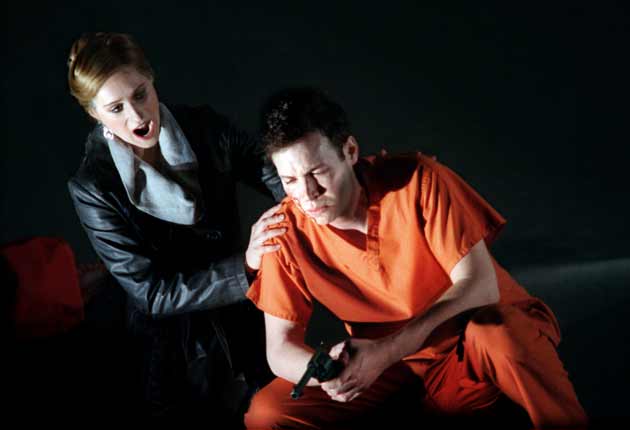Rodelinda, Britten Theatre, London <br/> La Clemenza di Tito, Arts Theatre, Cambridge
How does a queen stand up to a two-headed predator? In a pair of killer heels ...

Your support helps us to tell the story
From reproductive rights to climate change to Big Tech, The Independent is on the ground when the story is developing. Whether it's investigating the financials of Elon Musk's pro-Trump PAC or producing our latest documentary, 'The A Word', which shines a light on the American women fighting for reproductive rights, we know how important it is to parse out the facts from the messaging.
At such a critical moment in US history, we need reporters on the ground. Your donation allows us to keep sending journalists to speak to both sides of the story.
The Independent is trusted by Americans across the entire political spectrum. And unlike many other quality news outlets, we choose not to lock Americans out of our reporting and analysis with paywalls. We believe quality journalism should be available to everyone, paid for by those who can afford it.
Your support makes all the difference.Down by the bins, a dishevelled figure lurks, hands wringing wretchedly in fingerless gloves. There is a power struggle over Milan, and this rightful king is living rough, his grieving wife believing him to be dead. When Rodelinda was first performed in 1725, hard on the heels of Handel's other London hits, it was said that the city's audience would never tolerate an opera about politics in Lombardy. An understandable view – except that Rodelinda is only secondarily about power, and firstly about an indomitable marriage.
The Royal College of Music, as part of the London Handel Festival, which runs until 1 May, sets its Rodelinda in an updated northern Italy. A cruel, two-headed eagle presides over the people from the banner of the Forze Unite di Parma e Milano. The heroine of the title stands her ground in killer heels, her aggressors in battle fatigues, and when the sly usurper Grimoaldo tries to get to her through her child, he offers the boy a Game Boy. The political machinations, unfolded in a series of ricocheting arias, are played out against the brutal backdrop of a military installation – all corrugated walls and two-way mirrors – in a production designed and directed by David Fielding. That we can see the violent interrogation of usurped king Bertarido, even as the tyrant begins privately to question his own actions, illustrates graphically how torture can have its own momentum even while those at the top develop misgivings. Only nature is incorruptible, although for every soothing zephyr there is a dangerous storm, for every songbird, a predator with two faces.
Susanna Hurrell gives a scintillating performance as the defiant queen, scorching her tormentors in arias of brilliance and precision. As Bertarido, counter-tenor Christopher Lowrey is by turns beguiling, imposing, and virtuosic. Effortless in its athleticism while richly seasoned, this is a remarkable voice. Such RCM productions are billed as our chance to see tomorrow's stars today, but these two principals are quite the equal of many already on the circuit. The all-round standard of acting and diction is inspiring, even if Fielding subscribes to the wield-and-slump school of directing – at moments of passion, fling a prop, and flop on the floor.
Hugely impressive too in this, one of two casts, are Jake Arditti as Bertarido's beleaguered confidant Unulfo, Anthony Gregory, imposing as Grimoaldo, Edward Grint as the opportunist Garibaldo, and Kitty Whately as Bertarido's manipulated sister Eduige, kicking off her stilettos and wiping away her make-up in a final, liberating act of independence.
Laurence Cummings conducts this rewarding cast and London Handel Orchestra at exhilarating tempi, lickety-split. A joy from start to finish.
Joy, and just about every other emotion, is in short supply in English Touring Opera's oddly cast La Clemenza di Tito. Impressive to look at, with its ravishingly lit classical monuments and Tamara de Lempicka frocks, Mozart's noble opera extracts such bloodless performances from Gillian Ramm as the scheming Vitellia and Julia Riley as her bewitched suitor Sextus, that it is impossible to believe in the unscrupulous plans of one, and the heroic devotion of the other. Rowing manfully against this tide of indifference are Mark Wilde as the ever merciful ruler Titus, and Philip Spendley as his major-domo. Neil Irish's warmly lit set, in elevating Titus above his adoring people, reminds us that even popular leaders can become remote: the emperor who sent relief to stricken Pompeii also completed the bloody Colosseum.
Richard Lewis conducts, and there is some distinguished woodwind playing, but everyone had their work cut out in the arid acoustic of the Arts Theatre in Cambridge. It falls to the magnificent chorus, solid as monuments in their greatcoats and felt hats, to inject real fervour into a piece driven by nobility and passion.
'La Clemenza di Tito', Northcott, Exeter (01392 493493), Tues, and touring
Next Week
Anna Picard is at the Barbican for Peter Brook's A Magic Flute
Classical choice
Scottish Opera's new production of Richard Strauss's comedy of manners, Intermezzo, opens at the Theatre Royal, Glasgow (0844 871 7647), Sat. From Thursday, English National Opera and the Young Vic combine forces again, for a new production of Monteverdi's Return of Ulysses, above, at the Young Vic (020-7922 2922), Jonathan Cohen conducting.
Join our commenting forum
Join thought-provoking conversations, follow other Independent readers and see their replies
Comments